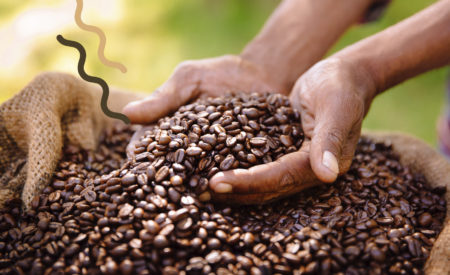Are you one of those people who feel out of sync until they’ve had their morning cup of coffee? Unbeknownst to you, you’re likely benefiting from one of caffeine’s positive effects, helping you start your day with increased focus and clarity.
Caffeine: a quick overview
Caffeine is a stimulant molecule belonging to the alkaloid family that influences certain biological mechanisms. It is not only contained in coffee: it is also found in other plants and foods such as Yerba maté, chocolate, guarana, or cola. Its properties are also exploited to produce some analgesic drugs or to relieve the symptoms of cold diseases.
How much caffeine in coffee?
The caffeine content in a cup depends on both the variety of beans used and the time and temperature of extraction. A cup of espresso coffee can contain between 50 and 80 mg of caffeine, while a cup of moka coffee can contain up to 120 mg. Decaffeinated coffee also contains it, although in very small doses: the method used for purification allows it to be reduced by about one-tenth.
Some of the possible side effects of coffee
Coffee can be considered a safe beverage when consumed in adequate amounts in people without particular medical conditions. However, individuals differ in their capacity to tolerate caffeine, depending on which side effects, given the same dose, are more or less intense. Some people may experience rapid heartbeat, difficulty sleeping, or stomach acidity. In any case, caffeine is metabolized rapidly, and the effects subside and then disappear within a few hours.
Benefits of caffeine
The effects of caffeine that we all recognize involve the nervous system, but there are also others, perhaps less popular but just as useful.
- Caffeine stimulates the central nervous system and can improve alertness.
- It can temporarily combat the feeling of drowsiness, allowing you to stay awake and focused for longer.
- The stimulating effect can lead to a feeling of well-being and uplift your mood.
- It improves sports performance: it can increase endurance, reduce fatigue, and improve capacity for physical exertion. Professional athletes know that it must be maintained within the levels allowed before a competition in order not to be classified as doping.
- The effect of coffee is also noticeable on digestion, as it stimulates gastric and biliary secretion.
- It has important antioxidant properties and, according to some studies, anti-inflammatory properties.
- It can work as an analgesic against headaches.
Nonetheless, one thing we can all enjoy is the positive impact of taking a coffee break, whether it’s a quiet moment of solitude or a chinwag with someone, a cup of coffee never fails to improve the day.





